Walmart just delivered the corporate equivalent of your friend saying they're "doing great" while nervously eyeing their dwindling bank account. America's retail behemoth raised its full-year outlook Thursday—sounds impressive!—while simultaneously warning investors that tariff costs are climbing. Classic mixed messaging.
For the first time since May 2022, Walmart missed earnings expectations. Think about that streak for a second. Two years of hitting targets in this economy deserves more than a golf clap. It's like maintaining a perfect driving record while everyone around you is texting behind the wheel.
The numbers tell the story: 68 cents adjusted EPS versus the 74 cents analysts expected. Not catastrophic, but enough to send shares tumbling nearly 4% in premarket trading.
Having covered retail for years, I've always found Walmart's relationship with tariffs particularly revealing. This company imports more Chinese goods than practically anyone in America. When their CFO John David Rainey mentions that "tariff-impacted costs are continuing to drift upwards," he's essentially giving us a real-time readout of trade policy impacts.
What fascinated me during yesterday's earnings call was the subtle contradiction in messaging about consumer behavior. In one breath, Rainey told CNBC customers remain "very resilient" with no major shift to cheaper store brands. Yet CEO Doug McMillon later acknowledged that middle and lower-income households are indeed more sensitive to price increases in discretionary categories.
Well, which is it?
This tension between the official "everything's fine" narrative and operational reality offers a fascinating glimpse into corporate psychology. Publicly, executives must project confidence. Privately? They're watching shopping patterns like hawks.
The market isn't stupid. Investors caught the contradiction.
Look, the most telling aspect wasn't even in the headline numbers but in McMillon's behavioral insights. When he mentioned customers "switch to other items, or in some cases, categories" in response to price increases, he was describing economic behavior that corporations spend millions studying. Money behaves like water—it doesn't vanish, it just flows differently when it hits obstacles.
I spoke with two retail analysts after the call who confirmed my suspicions: If Walmart—with its legendary supply chain efficiency and price optimization—is feeling the tariff squeeze, smaller retailers are probably facing existential choices between eating costs or losing customers.
It's retail Darwinism in action. Walmart can absorb hits that would bankrupt smaller competitors, potentially emerging from this period even more dominant. Ironic, isn't it? Tariffs designed partly to protect American businesses may accelerate consolidation that hurts many of them.
Walmart's tactical response speaks volumes. They're speeding up imports to beat tariff implementation dates and increasing "Rollbacks" (their term for temporary discounts) in strategic categories. This isn't panic—it's calculated chess moves from a company thinking several steps ahead.
The gap between their solid comparable sales growth (4.6% for Walmart U.S.) and disappointing earnings performance perfectly illustrates retail's current conundrum: More revenue doesn't automatically mean more profit when costs keep climbing.
Nobody expected navigating 2024's economic landscape would be a cakewalk. But Walmart's earnings report feels like they're simultaneously planning a beach vacation while packing an umbrella. The company is raising guidance (party time!) while warning about rising tariff costs (batten down the hatches!).
Which, when you think about it, might be exactly the right approach for whatever economic weather comes next.
